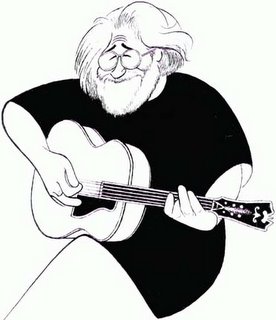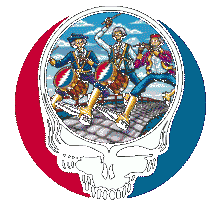What Would Jerry Do?

From TMC.net:
What Would Jerry Do?
By TRACEY E. SCHELMETIC
Editorial Director, CUSTOMER INTER@CTION Solutions
It's interesting sometimes how the so-called generation gap exists not between people of different generations, but the same people bridging the generation gap between their old selves and their new.
In the 60s and 70s when the flowers were beautiful, the love was free and the song-singing was live and spontaneous, no one was thinking very much about adhering to strict copyright regulations. Musicians were artists first, and record companies made their profits off the fruits and whims of musical acts. (Look at some of the frankly quite unattractive but very successful musicians of the 1970s progressive rock era and tell me if you think any of them would ever succeed in scoring a major record contract in today's music business climate, which values physical appearance above all else.)
Folk singer Woody Guthrie once wrote, in regards to a song's copyright notice, something like this: "This song is copyrighted in the U.S. for a period of 28 years. Anybody caught singin' it without our permission will be mighty good friends of ourn, 'cause we don't give a dern. Publish it. Write it. Sing it. Swing to it. Yodel it. We wrote it. That's all we wanted to do." (Interestingly, a parody version of Guthrie's "This Land Is Your Land" used by JibJab.com during the last presidential election prompted a cease and desist letter from a company that claims to own the copyright of the song. The company backed down when an organization called the Electronic Frontier Foundation issued an opinion that the song is now in the public domain, but that's another story.)
Any discussion of the music and musical lifestyle of the 60s and 70s invariably comes round to the Grateful Dead. The Associated Press today reports that Internet Archive, a content catalog Web site, has once again made available for free downloads of Grateful Dead live concert recordings, in accordance with the wishes of the remaining members of the band.
This is a reversal of a previous decision to charge for such recordings: a position that angered and bewildered followers of a band that was once so open to fans recording live performances that it used to create a special "taping" section in various concert forums for attendees who wished to record. The backlash from fans (including the circulation of a petition and a threatened boycott) has been credited for the reverse decision.
The band, which has been defunct since the death of Jerry Garcia 10 years ago, still maintains the rights to control professional recordings of live concerts made directly from the soundboard equipment. I'm sure few people would begrudge them that right. Before 1995, a large chunk of the band's income came from live tour ticket sales, which are no longer possible, and even old hippies still have to buy their tofu and pay the mortgage.
In its heyday, the Grateful Dead was famous for its long, interpretive live renditions of its songs, and the different versions were known to vary widely from concert to concert. Fan recordings of live shows are collected and traded widely; peer-to-peer networking in recent years has obviously been a great enabler of this kind of sharing.
But as we all know, sharing, once the hallmark of the counter-culture, is frowned upon in this era where the record companies manufacture the acts, control the music, and value market share over music.
I'm fairly certain that neither Woody Guthrie nor Jerry would approve.
The archives can be accessed at http://www.archive.org/.
Tracey Schelmetic is editorial director for CUSTOMER INTER@CTION Solutions. For more articles please visit Tracey Schelmetic’s columnist page.



1 Comments:
We're having a Grateful Dead tribute show this sunday 1 of nov in Gothenburg, Sweden. Heads from all over the country is coming and we're broacasting live on this link :
http://www.ustream.tv/channel/grateful-dead-tribute
The show starts at 13.00 new york time! Hope you're watching!
Post a Comment
<< Home